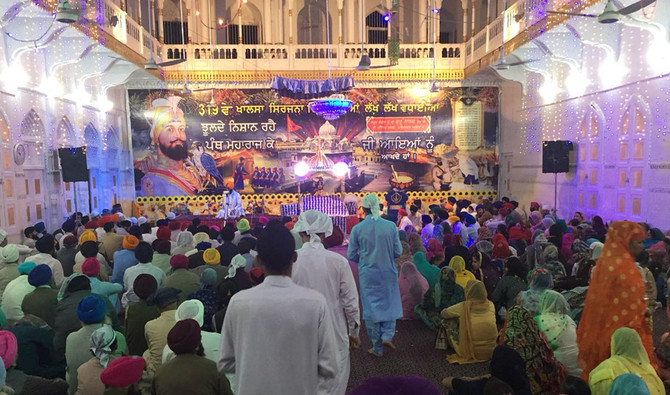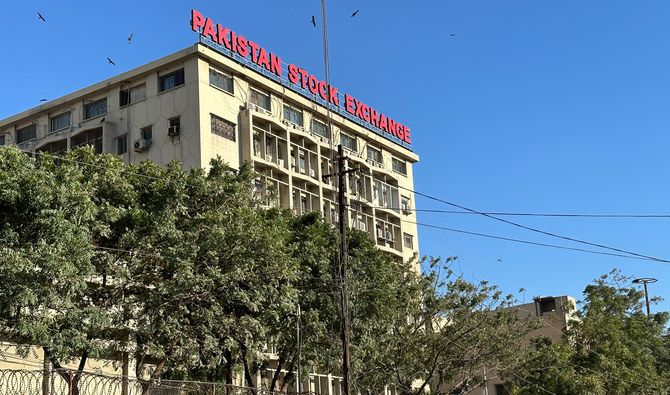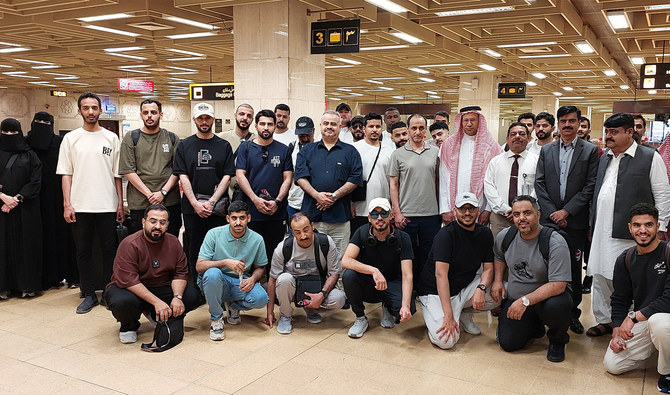ISLAMABAD: Former diplomats and members from Pakistan’s Sikh community welcomed the government’s initiative on Monday to develop a cross-border corridor which would allow pilgrims from India to visit the final resting place of Guru Nanak, the religion’s founder, in Kartarpur.
“We are very excited to welcome our Indian brothers to Gurdwara Darbar Sahib Kartarpur. We are thankful to Prime Minister Imran Khan for facilitating our brothers and sisters across the border,” Ranjeet Singh, a lawmaker in the Khyber Pakhtunkhwa Assembly, told Arab News.
He added that Sikhs from across the globe have been lobbying for years to get an easy access to the revered shrine where Guru Nanak spent the last 18 years of his life. “Kartarpur Gurdwara is one of the most sacred places for the Sikh community and provision of easy access to the pilgrims, I believe, will also augur well for peace and prosperity in Pakistan,” he said.
“The opening of the Kartarpur corridor also shows that Pakistan cares for its religious minorities and this will send a good message to the international community as well,” Singh added.
Prime Minister Imran Khan is expected to participate in a groundbreaking ceremony in Kartarpur on November 28, which will be attended by dignitaries and journalists from both the countries. “We will grant a visa-free entrance to all the pilgrims coming from India and a separate mechanism for that purpose is being developed,” Fawad Chaudhry, Federal Minister for Information, told journalists on Friday.
The Indian government has also agreed to develop the corridor on its side to facilitate the pilgrims. India’s Vice-president M Venkaiah Naidu on Monday laid the foundation stone for the construction of the 4km-long corridor connecting Dera Baba Nanak in India’s Gurdaspur district with the Gurdwara Kartarpur Sahib in Pakistan.
Former ambassadors also welcomed the move saying that it would increase people to people contact in both the countries. “This is a good initiative,” Aziz Ahmad Khan, a former diplomat, told Arab News. He, however, said that this is a “very small” step to help normalize relations between the two nuclear-armed neighbors. “The initiative will help improve the environment, but normalization of the relationship (between Pakistan and India) is a complicated process,” he said.
Former ambassador Ayaz Wazir concurred, adding that: “Pakistan and India are two important countries in the region and their cordial relationship can contribute to prosperity and regional peace including peaceful settlement of Afghan conflict.”
The Kartarpur corridor will be a cross-border gateway between Pakistan and India to allow Sikh pilgrims easy access to the holy shrine of Kartarpur Sahib. It is located in the Narowal district of Pakistan’s Punjab province along the river Ravi, four kilometers from the Indian border.
The shrine was built to commemorate the site where Guru Nanak, the founder of Sikhism, stayed after completing his missionary work. He formed a Sikh community there and resided in the place for 18 years until his death in 1539. The Gurdwara is built in the same place where Guru Nanak is said to have died. Its religious significance can be gauged from the fact that Indian Sikhs gather in large numbers for darshans (sacred viewing of the site) using telescopes from across the border.
Plans to build the corridor were first proposed in 1999 when India’s late Prime Minister, Atal Bihari Vajpayee, took a highly-symbolic bus ride from New Delhi to Lahore on the inaugural journey of Routemaster 10, which was intended to provide a means for citizens of India and Pakistan to visit each other. The bus service was briefly discontinued following the attack on the Indian Parliament in 2001 and resumed operations in 2003.
The total population of Sikhs is estimated to be around 27 million across the world, out of which 20.8 million reside in India, with Pakistan home to approximately 10,000 community members. Pakistan’s Sikh population is predominantly Pashtun inhabiting areas in the northwest Khyber Pakhtunkhwa region and tribal districts.
Pakistani Sikhs, diplomats welcome opening of Kartarpur corridor
Pakistani Sikhs, diplomats welcome opening of Kartarpur corridor

- Place holds significance as founder of religion had lived there for 18 years until his death
- Lawmaker says move reflects country’s care and concern for minority communities
ICC shortlists Pakistan’s Shaheen Afridi, UAE’s Waseem for Player of the Month award

- Shaheen Shah Afridi took eight wickets in last month’s T20I home series against New Zealand
- UAE’s Mohammad Waseem smashed 56-ball century in last month’s ACC Premier Cup final
ISLAMABAD: Pakistan’s pace sensation Shaheen Shah Afridi and UAE batter Muhammad Waseem have been shortlisted for the ICC Player of the Month award for April 2024, the International Cricket Council (ICC) reported on Monday, after the left-arm bowler’s string of impressive performances against New Zealand last month.
Afridi led Pakistan’s pace attack against New Zealand in a home T20I series against the Black Caps in April. Pakistan failed to win the series against a second-string New Zealand squad but drew 2-2 against Michael Bracewell’s squad.
The left-arm pacer, however, played a key role in Pakistan’s victories in two of the five matches played between the teams.
The second T20I saw Afridi blitz through the Blackcaps batting lineup, taking three for 13 as Pakistan registered a dominant victory. Then, trailing in the series for the fifth and final contest, Afridi once again wreaked havoc, taking four for 30 to salvage the series draw. Eight wickets in the series at an average of 10.00 saw Afridi walk away with the Player of the Series prize.
“Shaheen picked up the only wicket in the rain-affected opening match of the series with the Kiwis and then followed that up with two eye-catching efforts in the second and fifth games of the series in Rawalpindi and Lahore,” the ICC said in a report.
“Eight wickets in the series at an average of 10.00 saw Afridi walk away with the Player of the Series prize.”
UAE’s pinch-hitter Waseem is also among the three nominees from the men’s category after scoring bulk runs at the ACC Premier Cup and helping himself to a third T20I century in April. Waseem started the month with a first-ball duck against Kuwait before the 30-year-old quickly found form at the top of the UAE batting order as he helped himself to innings of 65, 45 and 48 in three consecutive matches.
“But Waseem’s highlight of the month came in the final of the ACC Premier Cup as he smashed six fours and a whopping seven sixes in making his third T20I century from just 56 deliveries and helping UAE to an impressive 55-run triumph over Oman,” the ICC said.
Namibia’s Gerhard Erasmus is the third nominee shortlisted by the ICC for his impressive performances during the team’s tour of Oman in April.
Erasmus produced two Player of the Match performances over the course of the five-match T20I series, with his first one coming in a narrow six-run loss in the second game of the series when the versatile all-rounder hit 58 from 56 deliveries and backed that up with a spell that netted 3/7.
However, in the decisive fifth match, Erasmus smashed six sixes when scoring a quickfire 64 from 29 deliveries and then made a pair of crucial breakthroughs as Namibia clinched the series with an emphatic 62-run triumph.
Afridi, who has 81 wickets from 61 T20Is, will be Pakistan’s pace attack leader as the green shirts take on Ireland and England in two away series this month. Pakistan will then head to the US and West Indies where they are scheduled to compete in the ICC T20 World Cup 2024.
Pakistan top court suspends verdict denying reserved parliamentary seats to Khan-backed party

- Under election rules, parties are allotted reserved seats in proportion to number of parliamentary seats they win in polls
- Election Commission ruled in March Khan-backed SIC was not eligible for reserved seats, Peshawar High Court upheld ruling
ISLAMABAD: Pakistan’s top court on Monday suspended a verdict by the Peshawar High Court (PHC) that a party aligned with candidates backed by former premier Imran Khan was not eligible for reserved seats in the legislature, a blow for the country’s coalition government headed by Prime Minister Shehbaz Sharif.
Khan’s Pakistan Tehreek-e-Insaf (PTI) party couldn’t contest the Feb. 8 elections under its traditional electoral symbol, a cricket bat, which it was denied on technical grounds. The PTI subsequently struck an alliance with another party, the Sunni Ittehad Council (SIC), in a bid to secure reserved seats for women and minorities in parliament.
Under Pakistan’s election rules, political parties are allotted reserved seats in proportion to the number of parliamentary seats they win in the election. This completes the National Assembly’s total strength of 336 seats.
The Election Commission had ruled in March that the SIC was not eligible for reserved seats, a decision the alliance had appealed in the PHC, which also rejected it. The SIC then approached the Supreme Court to appeal the high court’s decision.
A three-member bench of the top court took up the SIC’s petition for hearing on Monday.
“The Supreme Court has suspended the Election Commission’s order and the Peshawar High Court’s order,” PTI Chairman Gohar Khan, who is also Khan’s lawyer, told reporters outside the top court after it rejected the PHC verdict. “This is a vindication of our stance.”
He said the Supreme Court had also barred members of other political parties elected on reserved seats that should have been allotted to the SIC from casting their votes for or against any legislation.
The PTI leader said the SIC had been deprived of 67 reserved seats for women and 11 parliamentary seats for minorities. After losing 78 reserved seats, PM Sharif’s coalition government had lost its two-thirds majority, he added.
Khan, who is in jail following a string of convictions, and his PTI say the party was stripped of its bat symbol as a ruse to undermine its popularity and keep it from winning a maximum number of seats in general elections.
In February, an agreement between Bhutto Zardari’s Pakistan Peoples Party (PPP) and the Pakistan Muslim League-Nawaz (PML-N) of three-time Premier Nawaz Sharif ended days of uncertainty and negotiations after the Feb. 8 elections produced a hung national assembly.
The PML-N’s 79 and the PPP’s 54 seats together made a simple majority in parliament to form a government and they also roped in smaller parties in the coalition.
Candidates backed by Khan won 93 seats but did not have the numbers to form a government. He and his party have rejected the results of the elections, alleging widespread rigging.
Pakistan’s benchmark share index rises as much as 1.5%

- Pakistan’s benchmark share index has surged 73.4% over the past year, up 12.9% year-to-date
- Market reacting to Saudi business delegation’s arrival, IMF statement on mission visit, says analyst
KARACHI: Pakistan’s benchmark share index rose 1.5% during intraday trade on Monday, to an intraday high of 72,986 points.
The index has surged 73.4% over the past year and is up 12.9% year-to-date.
A Saudi delegation arrived in Pakistan on Sunday for talks on trade and investment opportunities, particularly in the exploration and production sectors.
Adnan Sheikh, assistant vice president at Pak Kuwait Investment Company, said the market was up following news of the delegation’s arrival along with an IMF statement regarding a mission visit.
“The PSX is still very cheap with price to earnings ratio of under 5x compared to average of 8x,” Sheikh added.
Pakistan last month completed a short-term $3 billion program, which helped stave off sovereign default, but the government of Prime Minister Shehbaz Sharif has stressed the need for a new longer term program.
An International Monetary Fund mission is expected to visit Pakistan this month to discuss a program, the lender said on Sunday ahead of Islamabad beginning its annual budget-making process for the next financial year.
The IMF did not specify the dates of the visit, nor the size or duration of the program.
Earlier, in an interview with Reuters, Finance Minister Muhammad Aurangzeb said the country hoped to agree the outlines of a new IMF loan in May.
Pakistan is expected to seek at least $6 billion and request additional financing from the Fund under the Resilience and Sustainability Trust.
Saudi officials arrive in Karachi to carry out immigration procedures under Makkah Route Initiative

- Makkah Route Initiative allows for completion of immigration procedures at pilgrims’ country of departure
- A total of 65,000 pilgrims in Karachi, Islamabad are expected to utilize Makkah Route Initiative during this year’s Hajj
ISLAMABAD: Saudi officials arrived in the southern port city of Karachi on Monday to carry out immigration procedures under the Makkah Route Initiative for Hajj pilgrims, the Pakistan Civil Aviation Authority (PCAA) said.
Pakistani officials confirmed in April Saudi Arabia’s decision to approve the Makkah Route Initiative’s expansion to the airport in Karachi, the country’s most populous city. Launched in 2019, the program was initially extended only to the airport in Islamabad.
The Makkah Route Initiative allows for the completion of immigration procedures at the pilgrims’ country of departure, making it possible to bypass long immigration and customs checks on reaching Saudi Arabia. The facility significantly reduces waiting times and makes the entry process smoother and faster.
“A group of 44 Saudi immigration officials has arrived in Karachi as part of the Road to Makkah Project,” PCAA said in a statement. “The immigration team will carry out Saudi immigration procedures for Hajj pilgrims at Karachi airport who are traveling under the Road to Makkah Project.”
The Saudi immigration officials were welcomed by the acting counsel general of Saudi Arabia in Karachi, the director of Hajj in Pakistan, representatives of the Airport Security Force, Pakistan Customs, Anti-Narcotics Force, Border Health Services, and the Federal Investigation Agency.
Pakistan’s religious affairs secretary told a media briefing in April that a total of 65,000 Hajj pilgrims would utilize the Makkah Route Initiative at Karachi and Islamabad airports this year. The official said 41,000 of the 65,000 pilgrims will make use of the facility under the government’s Hajj scheme, while the remaining 24,000 will rely on private tour operators.
A total of 29,500 pilgrims will use the facility from Islamabad while 35,500 will be able to avail it from the Jinnah International Airport in Karachi.
Saudi Arabia last year restored Pakistan’s pre-pandemic Hajj quota of 179,210 pilgrims and abolished the upper age limit of 65. More than 81,000 Pakistani pilgrims performed Hajj under the government scheme in 2023, while the rest used private tour operators.
Pakistan will launch Hajj 2024 operations from May 9 in eight airports across the country till June 9. This year’s pilgrimage is expected to take place from June 14-19.
Pakistan wants ‘larger, longer’ IMF bailout, PIA privatization by early July — FinMin

- Pakistan last month completed a short-term $3 billion program that helped stave off sovereign default
- Finance minister says hopeful PIA and other privatization deals would get through “finishing line” by early July
ISLAMABAD: Finance Minister Muhammad Aurangzeb said on Monday Islamabad was seeking a “larger and longer” bailout program from the International Monetary Fund, whose mission would arrive in Islamabad within the next ten days to start discussing a new loan deal.
Pakistan last month completed a short-term $3 billion program, which helped stave off sovereign default, but the government of Prime Minister Shehbaz Sharif has stressed the need for a fresh, longer term program.
Pakistan’s financial year runs from July to June and its budget for fiscal year 2025, the first by Sharif’s new government, has to be presented before June 30.
The IMF has not specified the dates of its Islamabad visit, nor the size or duration of any new program.
“We have requested the IMF … that we want to go into a larger and a longer program with the fund and they have acceded that request, and we are expecting the mission to arrive here within a week to 10 days, where we will start discussing the contours of the next program,” Aurangzeb said while addressing a conference in Islamabad.
He said Pakistan needed a new IMF program to bring “permanence” to macroeconomic stability and continue to carry out “structural reforms.”
The IMF has said accelerating reforms was more important than the size of a new program, which would be guided by a package of reforms and balance of payments needs.
Under the last $3 billion bailout, Pakistan implemented several IMF-mandated reforms, such as budget adjustments, increasing interest rates, and higher energy prices.
Among expected reforms under a new program are strengthening public finances through gradual fiscal consolidation, broadening the existing tax base and improving tax administration, and debt sustainability, all while protecting the vulnerable.
Pakistan also needs to restore the viability of the energy sector and prevent further accumulation of circular debt arising from subsidies and unpaid bills. Other reforms will include cutting inflation, stimulating private sector growth and adopting a market-driven exchange rate to help balance external accounts and rebuild foreign reserves.
PIA PRIVATIZATION
“We have to broaden our tax base,” the finance minister said, outlining reforms under new IMF deal. “Our tax to GDP [ratio] is languishing at about 9 percent ... we have to start moving it toward 14- 15 percent.”
“We have to start resolving the complex energy equation … And the third one is the SOE [state-owned enterprises] reform,” Aurangzeb said. “Our prime minister has been very clear that the government has no business being in business … We need to and we will accelerate the privatization agenda.”
He said he hoped that PIA, the national carrier, and other privatization deals would get through the “finishing line” by early July.
Last week, Pakistan pushed back the deadline for companies to express interest in buying PIA to May 18, a day before the expressions had originally been due. The privatization commission says 10 companies have already expressed an interest.
Pakistan’s government has previously said it was putting on the block a stake of between 51 percent and 100 percent in the loss-making airline.
The disposal of the flag carrier is a step that past elected governments have steered away from as it is likely to be highly unpopular, but progress on privatization is key to helping cash-strapped Pakistan pursue further funding talks with the IMF.










